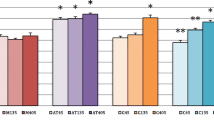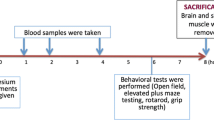Abstract
The influence of dietary citrate on the toxicity of orally ingested lead was investigated in male weanling mice. Twenty-four animals were divided into three equal groups. Group 1 served as controls, groups 2 and 3 were given 20 μg lead (as lead acetate) per g/diet, group 3 also received 4% sodium citrate in the diet.
After 5 weeks, blood and tissue lead levels were measured. All mice given lead-supplemented diets had higher concentrations of lead in blood, liver, kidney, brain and bone than the control group, but the increase was significantly greater in the group given 4% sodium citrate in the diet. This work demonstrated that dietary citrate at levels which can be present in food significantly increases lead toxicity.
Similar content being viewed by others
References
WHO,Environmental Health Criteria 3-Lead, WHO Geneva 1977.
R.R. Bell andJ.T. Spickett,The influence of milk in the diet on the toxicity of orally ingested lead in rats, Fd. Cosmet. Toxicol.19, 429 (1981).
J.T. Spickett andR.R. Bell,The influence of dietary phosphate on the toxicity of orally ingested lead in rats, Fd. Chem. Toxic.21, 157 (1983).
R.R. Bell andJ.T. Spickett,The influence of dietary fat on the toxicity of orally ingested lead in rats, Fd. Chem. Toxic. 21, 4, 469 (1983).
R.S. Goodhart andM.E. Shils,Modern Nutrition in Health and Disease, 6th edn. Philadelphia, Lea & Febiger 1980.
B.T. Garber andE. Wei,Influence on dietary factors on the gastro-intestinal absorption of lead, Toxic appl. Pharmac.27, 685 (1974).
N.P. Kubasik, M.T. Volsin andM.H. Murray,Carbon rod atomiser applied to measurement of lead in whole blood by atomic absorption spectrophotometry, Clin. Chem.18, 410 (1972).
FASEB, SCOGS,Evaluation of the health aspects of citric acid and citrates as food ingredients, Report 84 (NTIS PB 280–954) (1977).
National Health and Medical Research Council,Approved Food Standards and Approved Food Additives. Aust. Govt. Publishing Service, Canberra 1982.
C.F. Church andH.N. Church, 1975.Food Values of Portions Commonly Used, 12th edn, p. 162, J. B. Lippincott Company, Philadelphia 1975.
N. Freydeberg andN.A. Gartner,The Food Additives Book, Toronto, Bantam Books 1982.
R. Stephens andH.A. Waldron,The influence of milk related dietary constituents in lead metabolism, Fd. Cosmet. Toxicol.13, 55 (1975).
S. Jugo, T. Maljkovic andK. Kostial,Influence of chelating agents on the gastrointestinal absorption of lead, Toxic. appl. Pharmac.34, 259 (1975).
K.R. Mahaffey,Quantities of lead producing health effects in humans: sources and bioavailability, Envir. Health. Perspect.19, 285 (1977).
National Health and Medical Research Council,Market Basket (Noxious Substances) Survey 1980. Ninety-second session, October. AGPS, Canberra 1981.
National Health and Medical Research Council,Public Health Advisory Committee. Eightyeighth session,October. AGPS, Canberra 1979.
Food and Drug Administration,Food for human consumption, parts 1 & 2. Office of the Federal Registrar, National Archives and Records Service, General Services Administration 1981.
Author information
Authors and Affiliations
Rights and permissions
About this article
Cite this article
Spickett, J.T., Bell, R.R., Stawell, J. et al. The influence of dietary citrate on the absorption and retention of orally ingested lead. Agents and Actions 15, 459–462 (1984). https://doi.org/10.1007/BF01972388
Received:
Accepted:
Issue Date:
DOI: https://doi.org/10.1007/BF01972388




